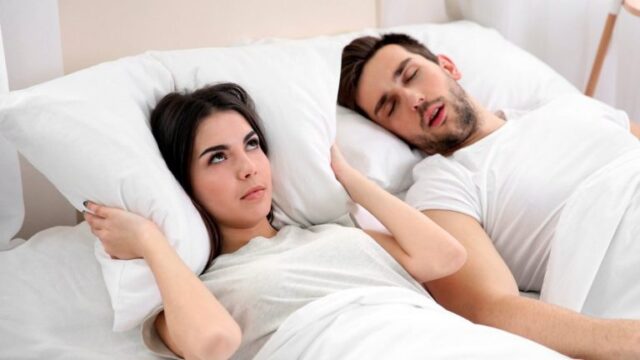If you snore loudly and feel tired even after a full night’s sleep, you might have sleep apnea. Most people with sleep apnea have obstructive sleep apnea (OSA). This happens when there is a physical blockage in the upper airway. When a person has sleep apnea, their breathing repeatedly stops and starts during sleep.
Untreated sleep apnea may lead to complications such as heart disease and depression. It can also leave a person feeling drowsy, increasing the risk of accidents while driving or working.
A person with sleep apnea may be unaware of their symptoms, but another person may notice that while sleeping. The person stops breathing for a while, followed by a noisy breath, gasps for air or snores loudly.
Symptoms
The individual may notice that they experience:
- Fatigue
- Restless sleep or insomnia
- Difficulty concentrating
- Waking up several times a night to urinate
- Awakening with a dry mouth or sore throat
- Headaches
- Irritability
- Heartburn
TREATMENT
Lifestyle modifications are essential to normalizing breathing and are critical first steps in treatment.
Positive airway pressure (PAP) is the most efficacious therapy for treating Obstructive Sleep Apnoea(OSA), but not all patients are able to tolerate PAP or are willing to use it on a long-term basis. For many patients, oral appliance therapy (OAT) can be an effective alternative.
Fabrication of an OAT device and its implementation are specialized skills that should be done by a qualified dentist, as advocated by the professional societies.
Importantly, dentists play a crucial role in evaluating patients with OSA for the suitability of OAT, choosing the proper OAT appliance, adjusting the OAT appliance and assessing the patient for adverse effects.
Three main categories of dental devices for OSA are:
- Mandibular advancement devices. These are made of molded hard plastic. These devices snap over your lower and upper teeth, and also feature metal hinges and screws that can be tightened to push your lower jaw forward.
2. Mouth guards. Similar to mandibular advancement devices, these devices also help reposition your lower jaw, although to a lesser degree.
3. Tongue-retaining devices. These devices consist of a soft plastic splint placed around your tongue that holds it forward and out of your mouth throughout the night. They tend to make your mouth dry and can cause discomfort.
Struggling with snoring and sleeplessness???? Snoring and sleep disturbances are often signs of obstructive sleep apnea, and your oral health could be to blame. Call and schedule an appointment today!
